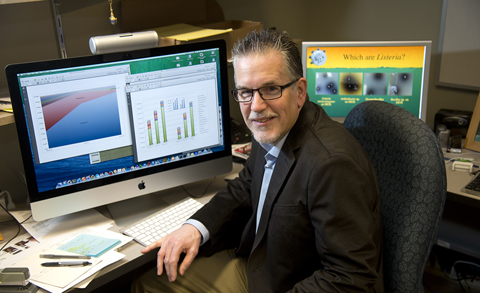Purdue Profiles: Bob Pruitt
November 4, 2014
 |
|
Bob Pruitt, professor of botany and plant pathology and director of Purdue's Center for Molecular Agriculture. (Purdue University photo/Mark Simons) |
Bob Pruitt can envision a future in which scientists have the know-how to tweak a plant's genome so it produces high-yield, optimally nutritious crops in a specific environment.
Plant sciences still have a long way to go to get there, says Pruitt, who is professor of botany and plant pathology. As director of Purdue's recently established Center for Molecular Agriculture, however, Pruitt is assembling a dynamic, multidisciplinary team of researchers who will work hard toward making that vision a reality.
It's all part of Purdue Moves, which seeks, among many other things, to advance the University's plant sciences research to tackle the grand challenge of world hunger.
What are some more details about the Center for Molecular Agriculture?
The center will consist of 10 new faculty members across disciplines who will work on research questions related to plant sciences. We're planning to hire five faculty members this year, and they'll begin their work in fall 2015. The other five we'll hire next year or the following year. They'll tentatively start in fall 2016. Soon, we'll also invite existing faculty members who are researching plant sciences or who have skills in those areas to join forces with the center.
The center's goal is to involve faculty in the fields of biochemistry, molecular biology, cellular biology, imaging and biosensors, genetics and genomics, ecology and environment, and computation and modeling. These faculty members will be tackling very complex scientific questions, which involve determining how plant genes, the environment, and the interaction between the two determine a plant’s characteristics.
Right now, we understand that scientists can breed a plant to achieve desirable characteristics in a certain environment. We don't understand, however, why those plants aren't as successful when they're moved to new environments. The fundamental questions behind that problem involve a lot of disciplines, and they're at the core of what we'll be researching.
How will the center involve the University's existing faculty?
There are a lot of investigators at the University who are already working on research that can be integrated into the center's mission. At the same time, there are other researchers who can lend their expertise and skills to our goals. We want an actively involved community, and so we'll be collaborating with existing faculty across the University as much as we can.
I'm very much an advocate of a team-based approach. The center will emphasize individualized research, but it'll also promote team-based work and interactions that will make us much more than the sum of our parts. For me, this is truly a once-in-a-career opportunity to tackle this grand challenge collaboratively with such accomplished colleagues.
The center also will have a learning aspect to its mission. More specifically, we hope to create a graduate program or tweak an existing one to train students to investigate these key questions about plant sciences. In addition to giving students an education with real value -- and one that will prepare them to do work of utmost importance to employers -- it will help us establish an environment in which young people are doing vibrant, cutting-edge basic science tied to a problem of global significance.
How did you become interested in plant sciences yourself?
My background is in genetics and molecular biology. Early in my career, I was working with fruit flies, and I became interested in how multicellular organisms work in general. I realized that there was very little investigation being done about plants. It was a new frontier, really, and it fascinated me.
Even in just the course of my career, the plant sciences field has made great strides, and it's amazing the rate at which technology and emerging practices have changed the field. It's a privilege to be part of the world-class plant sciences research at Purdue.
How do you hope the center's work eventually will affect global hunger?
For me, the center's long-term goal is for a scientist to be able to look at a specific plant's genome and its environment and predict with certainty what will happen. We also want scientists to be able to alter a plant's genome to achieve the most desirable characteristics in any given environment.
The center won't do the genetic altering, but we want to be able to generate the knowledge to make those things possible. If our discoveries help reach that point, the implications would be tremendous.
Further down the pipeline, for example, plant breeders will be able to tailor a crop plant’s developmental characteristics to a variety of climates or modify insect or disease resistance to match the specific problems endemic to a given area. The possibilities are endless.
Writer: Amanda Hamon Kunz, 49-61325, ahamon@purdue.edu

